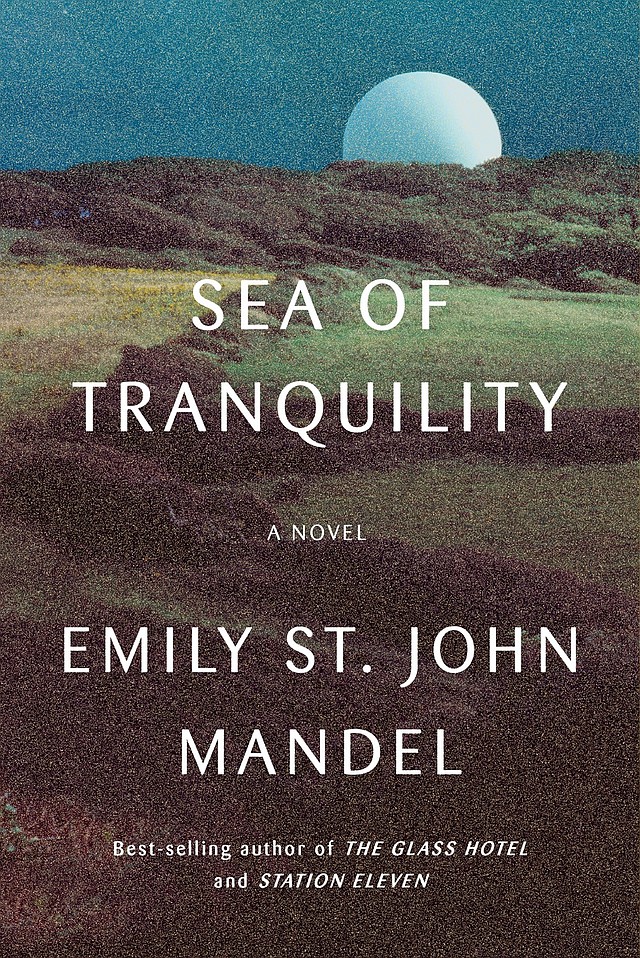One of the principal players in Canadian author Emily St. John Mandel’s new novel, “Sea of Tranquility,” is a novelist, Olive Llewellyn, who, like Mandel, was a talented but obscure mid-list author when she published a hugely successful book about a plague a few years before a real plague arrived, and who, after the plague’s arrival, became even more well known for having published an unsettlingly prescient novel.
In the book, Olive begins to question the nature of reality — as in, are we in some sort of simulation, or maybe an alternate universe of some kind? Because reality seems too peculiar, and filled with too many coincidences, to be exactly convincing.
Olive clearly has a lot to think about.
Given what her new book is about, Mandel herself appears to be considering some of the same questions, and “Sea of Tranquility” amounts to not so much a novel as an extended exercise in experimental thinking. It is very good. It is extremely entertaining. You will also want to read it now. Its texture is determined and enriched by its proximity to our own plague time, and I suspect its salience will fade rather soon.
 To the readers’ benefit, Mandel has mastered the art of inhabiting a genre landscape while writing literary fiction. (Photo courtesy of Knopf Publishing)
To the readers’ benefit, Mandel has mastered the art of inhabiting a genre landscape while writing literary fiction. (Photo courtesy of Knopf Publishing)
To get the most out of this book, it will help to have read two of Mandel’s previous novels. They are both also excellent. If you are new to Mandel’s work, “Station Eleven” (2014) is the one you may have heard of. It has since been made into an outstanding HBO miniseries depicting an eerily familiar plague world and its aftermath. Characters and events from “Station Eleven” are featured in Mandel’s previous book, “The Glass Hotel” (2020), as well as in “Sea of Tranquility.” Together, these novels form a loose trilogy. Figures slide between alternate realities in these three books, with great and ghostly effects.
Mandel’s virtues are many. Notwithstanding her attraction to mystery and science fiction, she is fundamentally a literary novelist; that is, she writes in such a way as to discover the story she is telling. This is a fairly standard approach among the literary bunch. One allows one’s characters to emerge from whatever landscapes and situations one is compelled to envision.
These elements, once put in communication with one another, are used to summon the outline of a story. Eventually, a book shows up. The process is a little alchemical, a little mystical and time-consuming. This approach can be roughly distinguished from that of a genre writer, whose works we admire on their own terms, and who will typically adhere to a more or less reliable formula. Plots can be sketched in advance, and the movements of characters are essentially preordained.
But, speaking generally, works of genre are less memorable and considered lesser creations. Why? Because they do not actually depict the messy, unpredictable, non-formulaic thing life is, and so do not hit us where it counts. While even a short work of literature can feel deep, the longest piece of genre writing will feel relatively shallow.
To our great benefit, Mandel has mastered the art of inhabiting a genre landscape while writing literary fiction. It is the best possible combination. The plot of “Sea of Tranquility” is not exactly the point. Suffice to say there are airships and moon colonies, time travel, remittance men, remote Vancouver Island outposts, bad book tour encounters and interstellar journeys.
What is the story? It is how those elements interact. One does not read Mandel for the plot. Even the plague is not much on the page in “Station Eleven,” and while “The Glass Hotel” is about a Bernie Madoff-style swindler, Mandel’s attention is more drawn to the swindler’s wife and her friends and family. In all three books the plot, such as it is, is revealed in the first few pages — indeed by the jacket copy. Instead, one reads for Mandel’s ability to render consciousness, to allow for a single person to want utterly irreconcilable things, to love and despise themselves, to be human.
The only drawback of the literary approach can be that one’s endings can fall a little flat. Without the support of a familiar, formulaic structure there is often a slumping off, a lack of conclusive power. The ending of “Sea of Tranquility” is too tidy and pat, and thus not very interesting. But no matter. With any luck, there will be another installment in a year or two, and we can continue to inhabit Mandel’s illuminated universe.




